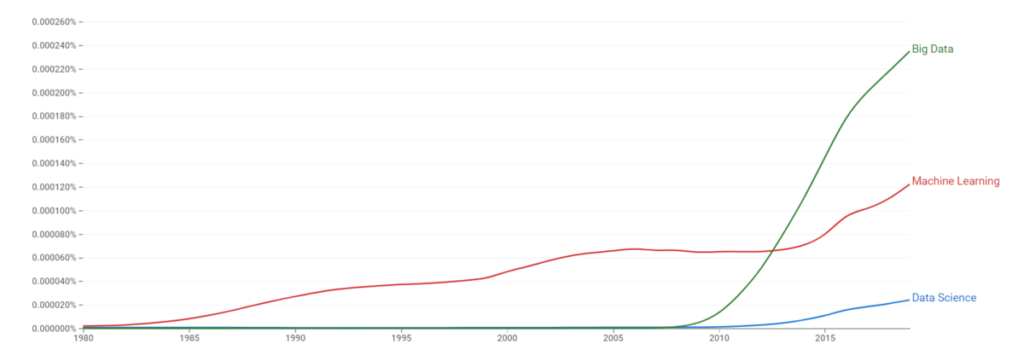Data Science is a relatively new scientific field. It started developing in the last decade and intermixes statistics, mathematics, and computer science. Data Science mainly concerns data analysis (similarly to statistics), utilizing various algorithms and programming languages (such as R and Python). Mostly working on large data sets (i.e., “Big Data”).
The workflow of a data scientist includes data import, data tidying and transformations, as well as visualizations and modelling. Eventually the data scientist is also in charge of communicating the results to decision makers.
Some terminology
This post mostly focuses on data science, but first, let’s clear up some other related terms:
Big Data – mostly relates to large scale data sets. There is no clear definition of when data becomes “big data” (but as a rule of thumb in the magnitude of hundreds of thousands of observations). Oftenly a data scientist will analyze big data.
Data Mining – A process used to describe the research work performed on the data. However, it is mostly known as a buzz word which is not that commonly used between actual professionals.
Machine Learning – A general term which refers to the collection and use of algorithms which fit prediction models based on data bases. It’s the job of the data scientist to examine the performance of different models, based on machine learning algorithms.
Deep Learning – A family of specific machine learning algorithms. These algorithms are also termed neural networks, and are used to predict outcomes of future observations based on existing observations.
Artificial Intelligence – The product of a process which is based on machine learning algorithms (e.g., an autonomous car is an example of artificial intelligence).
Data Science – A science which deals with the analysis of data. It is based on the principles of statistics and computer science. For further details, keep reading.

If we examine the appearance of three terms, Machine Learning, Big Data, and Data Science in the literature we see that the term machine learning is relatively old. Probably since it comes from a perspective of algorithms and computer science (which started developing in the previous century). In contrast, big data started developing towards 2010. Data science started developing a few years later, and is still less common than the other two (but rising). Now that the terms are more clear, we explain how data science can assist you in business , what are the qualifications and background of a data scientist, and what tools does a data scientist use.
How can data science help me in my business?
Today almost every transaction in your business is digitally recorded. Things such as newsletter effectiveness (which customers read a newsletter we distributed), logistic movements (demand and consumption of products, shipping, and delays), queues (arrival rates, waiting times, and service times). Customer purchases, and much more.
A data scientist can tap into the organization’s databases and can support the business’ decisions via data analysis and modelling.
This approach helps decrease the uncertainty, and mitigate the risks associated with our decisions. Different questions that we ask ourselves as part of our business decisions such as how to work more efficiently, what products should we market, or who are our best customers, which are most likely to make a purchase. If in the past managers had to make an educated guess, today they no longer need to guess because they can rely on a thorough methodological data science process.
In a sense, we can find an equivalence between a data scientist to more traditional professions such as a lawyer. Similarly to how a lawyer is a professional which uses the laws and legal precedents, a data scientist will base his work on principles and methodologies borrowed from mathematics, statistics, and computer science.
What are the qualifications of a data scientist?
In most cases a data scientist will have an academic background in fields such as statistics, mathematics, computer science, or related fields. There are some programs which offer a BSc in data science, but in most cases a data scientist will have an MSc or a PhD. Graduate studies educate and provide substance knowledge in how to properly conduct a research, which is missing in most undergraduate studies.
How can you combine data science in your business?
The time has come to improve the way you make decisions – stop guessing and start using data. Together we will help you implement the data science workflow in your business. Contact us for more information.

